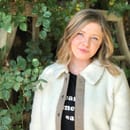Two benches sit in the midst of a busy mall decorated with twenty foot holiday wreaths, and playing the nostalgic sound of jingle bells through its halls. On one bench a group of four or five 20 something year olds huddle, clearly gathered as a group, yet each individual starred dully into the glowing screens in their hands. Opposite of them, on the other bench, was an old woman, doing something rather astonishing, she was… sitting. What felt so radical about this was at first unclear. Surely people sit all the time, but upon further inspection of the passers and goers I was struck by how many eyes were trained upon the small screens. And amidst it all here was a woman, who simply sat and took in the lights, and wreaths, and old familiar tunes.
She urged in me a nostalgia for a time when two people could meet standing in line at a busy mall, or in a bookshop. When two people, were not two social media presences, or two online dating profiles, but two people existing. I’d like to pause to acknowledge the massive good advanced tech does for the world. Technology has allowed global contact that expands our perspectives, provides platforms for important social movements, bettered medicine, lengthened life expectancy, and allowed greater access to resources for more people. But watching this woman I could not help feel that despite all it’s good, we had lost something in this age of Facebook and Snapchat.
In many ways humans have become creatures whose currency is entertainment, and we have drifted so far from connection to our deeper selves that the idea to trade that currency, to just sit, seems ridiculous and boring. We blast music, scroll through Twitter, watch Netflix, text friends, send Snapchats, listen to podcasts, Google celebrities, and so completely fill our brains that we hardly know what thoughts belong to us. There is something profound about the ability to just be. Spiritual leaders of all denominations and many a self-help guru preach the benefits of meditation, the practice of stillness. Meditation, or even taking time to just sit, alone with one’s own thoughts, often provides a greater clarity to decision making, beliefs, and desires. The great spiritual guide Eckhart Tolle said, “True intelligence operates silently. Stillness is where creativity and solutions to problems are found.”
Beyond the near extinction of stillness, we have in many ways lost the art of present living. We are constantly checking our phones and in doing so neglecting the experiences and people around us. My younger brother’s “hangouts” more often consist of playing video games online, than face-to-face human contact. I have become aware of how much of my time with friends and family consists of sharing memes and showing one another social media posts. Parents seem to care more about posting, than playing. The more we connect globally, the more it feels we lose the intimacy of connection with those directly around us. Take a moment this week to be still, to sit and observe the world around you, to collect your thoughts and focus your creativity, and to be present with the people around you. Be still, be present, and just plain be. “Life moves pretty fast. If you don’t stop and look around once in a while, you might miss it,” -A pretty poignant message from media itself.



